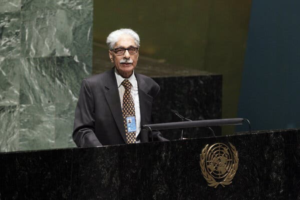
E S Reddy
Enuga Sreenivasulu Reddy died in Massachusetts, US, on November 1, 2020. He was not well-known in India, but the New York Times carried his obituary on November 5, 2020. What did he do to attract that much of interest?
Reddy was born in 1924 in the village of Pallapalli, Andhra Pradesh, India. Both his parents were involved in India’s freedom struggle. His father was jailed for participating in Gandhi’s protest campaigns, and his mother sold her jewelry to raise money for Gandhi’s efforts on behalf of India’s untouchables. Reddy was influenced by Gandhiji and Jawaharlal Nehru.
Reddy came to the US in 1946 and studied political science in New York University and Columbia University. In 1949, Reddy got a research job at the UN. He had been interested in South Africa, because he had listened to Gandhiji and Nehru speak about the problems in South Africa. He knew of course about Gandhiji’s struggles in that country.
While in New York, Reddy read about a mass passive resistance struggle launched by the South African Indians against a new law against them. In in July 1946, India stopped trade with South Africa and also wrote to the UN to discuss the question of South Africa.
Reddy began learning more about South Africa at the New York Council on African Affairs. He became a regular visitor to the Council’s library. He used to take notes about the struggles from the newspapers. He had no clear purpose, but he was very much interested in the issues. In 1946, India raised the South African issue in the UN. Delegations came from India and South Africa to brief the Indian Delegation and Reddy got involved in the process.
Reddy worked in the UN Middle East and Africa section for several years. In 1963, unexpectedly Reddy became the secretary of the UN Special Committee Against Apartheid. This was a great opportunity for him. He had had a feeling that he did not make enough sacrifice for India’s freedom, so he felt he should compensate by doing what he could for the rest of the colonies.
From 1963 to 1984, Reddy oversaw the UN’s efforts against apartheid first as principal secretary of the Special Committee Against Apartheid and then as director of the Center Against Apartheid. He campaigned against apartheid and for boycotts and other economic sanctions against the white South African government. He also lobbied relentlessly for the release of Nelson Mandela. For 20 years, Reddy worked seven days a week, 10 hours a day, on the apartheid issue.
Reddy helped the anti-apartheid movements all over the world a great deal. His committee set up a fund for the South African political prisoners and their families. He travelled to many countries seeking support for the anti-apartheid struggle. Gradually, more and more countries began supporting the struggle and implementing sanctions against South Africa.
Sean MacBride, former UN commissioner for Namibia and a Nobel Peace Prize winner, said of Reddy in 1985: “There is no one at the UN who has done more to expose the injustices of apartheid and the illegality of the South African regime than Reddy has. He had to face many obstacles and antagonisms, coming from the Western Powers mainly, but he had the skill, courage and determination necessary to overcome the systematic overt and covert opposition to the liberation of the people of Southern Africa.”
After Reddy retired in 1985, as a UN assistant general secretary, he wrote histories of the Black liberation and anti-apartheid movements and the links between India and South Africa. He was awarded the Joliot-Curie Medal of the World Peace Council in 1982. In 2013, he received the Order of the Companions of Oliver Tambo from the South African government, an honour named after the former African National Congress president-in-exile.
